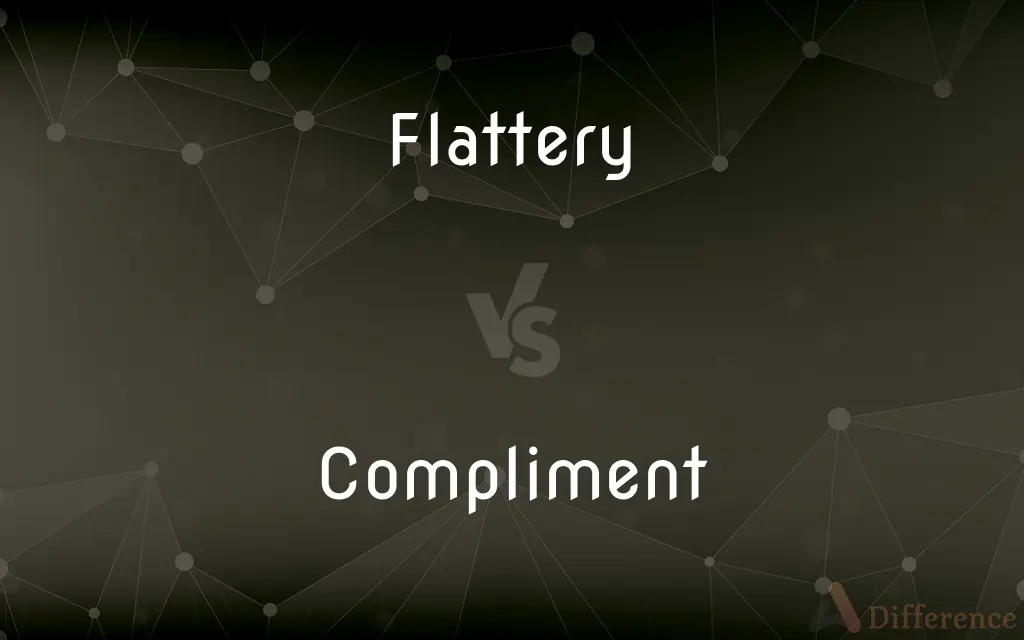Flattery vs. Compliment — What's the Difference?
By Tayyaba Rehman — Updated on September 16, 2023
Flattery is insincere praise to gain favor; Compliment is genuine praise or admiration.

Difference Between Flattery and Compliment
Table of Contents
ADVERTISEMENT
Key Differences
Flattery often contains excessive or insincere praise, aimed at winning someone's favor or attention. Compliment, in contrast, is an honest expression of admiration or approval regarding someone's quality or accomplishment.
Flattery may have an ulterior motive, intending to achieve something specific, like a favor or advantage. Compliment, on the other hand, generally lacks hidden agendas, being an authentic appreciation.
It's crucial to note that Flattery can sometimes be seen as manipulative, as it can be utilized to sway someone's opinion or decision. A Compliment, in its genuine form, does not seek to manipulate but simply acknowledges something positively.
Flattery and Compliment both involve positive remarks, but discerning the intent is vital. Flattery might sound over-the-top or overly effusive, while a Compliment sounds heartfelt and sincere.
While one should be wary of Flattery, especially when it feels excessive, it's generally pleasant and uplifting to receive a Compliment, as it is seen as a token of appreciation and recognition.
ADVERTISEMENT
Comparison Chart
Nature
Often insincere
Genuine
Intent
To gain favor or advantage
To express admiration or approval
Perception
Can be seen as manipulative
Viewed as heartfelt and sincere
Effect
Might feel over-the-top or excessive
Feels authentic and uplifting
Ulterior Motive
Likely
Unlikely
Compare with Definitions
Flattery
Excessive praise with a possible ulterior motive.
He was known to use Flattery to get ahead at work.
Compliment
Genuine praise for someone's merit.
She received a Compliment on her presentation skills.
Flattery
Insincere praise to gain advantage.
She quickly recognized his words as mere Flattery.
Compliment
An expression of admiration for an accomplishment.
His painting earned him many Compliments.
Flattery
Over-the-top compliments to charm or seduce.
She was immune to his Flattery.
Compliment
A sincere acknowledgment of someone's positive qualities.
She gave him a Compliment about his dedication to work.
Flattery
Adulation to manipulate or sway.
She used Flattery to get the last concert ticket.
Compliment
A polite expression of praise or admiration
She paid me an enormous compliment
Flattery
Flattery (also called adulation or blandishment) is the act of giving excessive compliments, generally for the purpose of ingratiating oneself with the subject. It is also used in pick-up lines when attempting to initiate sexual or romantic courtship.
Compliment
Politely congratulate or praise (someone) for something
He complimented Erika on her appearance
Flattery
The act or practice of flattering.
Compliment
An expression of praise, admiration, or congratulation.
Flattery
Excessive or insincere praise.
Compliment
A formal act of civility, courtesy, or respect.
Flattery
(uncountable) Excessive praise or approval, which is often insincere and sometimes contrived to win favour.
Compliment
Compliments Good wishes; regards
Extend my compliments to your parents. See Usage Note at complement.
Flattery
(countable) An instance of excessive praise.
Compliment
To pay a compliment to.
Flattery
The act or practice of flattering; the act of pleasing by artful commendation or compliments; adulation; false, insincere, or excessive praise.
Just praise is only a debt, but flattery is a present.
Flattery corrupts both the receiver and the giver.
Compliment
To show fondness, regard, or respect for by giving a gift or performing a favor.
Flattery
Excessive or insincere praise
Compliment
An expression of praise, congratulation, or respect.
Pay someone a compliment
Flattery
A tactic to make someone feel good for personal gain.
His Flattery was clearly aimed at getting a discount.
Compliment
(uncountable) Complimentary language; courtesy, flattery.
Compliment
(ambitransitive) To pay a compliment (to someone); to express a favourable opinion (of someone).
Compliment
An expression, by word or act, of approbation, regard, confidence, civility, or admiration; a flattering speech or attention; a ceremonious greeting; as, to send one's compliments to a friend.
Tedious waste of time, to sit and hearSo many hollow compliments and lies.
Many a compliment politely penned.
Compliment
To praise, flatter, or gratify, by expressions of approbation, respect, or congratulation; to make or pay a compliment to.
Monarchs should their inward soul disguise; . . . Should compliment their foes and shun their friends.
Compliment
To pass compliments; to use conventional expressions of respect.
I make the interlocutors, upon occasion, compliment with one another.
Compliment
A remark (or act) expressing praise and admiration
Compliment
Say something to someone that expresses praise;
He complimented her on her last physics paper
Compliment
Express respect or esteem for
Compliment
A courteous expression of esteem or regard.
It's a Compliment to be compared to such a renowned author.
Compliment
Positive feedback on appearance or style.
She got a Compliment on her new dress.
Common Curiosities
How do I distinguish Flattery from a Compliment?
Flattery may come across as excessive or insincere, while Compliments are genuine and heartfelt.
Is Flattery always bad?
Not necessarily, but it's essential to recognize its intent and not be manipulated by it.
Is it wrong to give Compliments often?
No, as long as they're sincere. Genuine compliments can uplift and encourage.
Can Flattery ever be genuine?
Flattery, by definition, carries insincerity, but compliments can be effusive yet genuine.
How can I ensure my Compliments are taken sincerely?
Be genuine, specific, and avoid over-exaggerating.
Do Compliments always need to be verbal?
No, they can be expressed through actions, gestures, or even written notes.
Why do people fall for Flattery?
Flattery can appeal to one's ego, making it a persuasive tool.
Why do people use Flattery?
Flattery can be used to gain favor, advantage, or manipulate situations.
What's the importance of a Compliment?
Compliments can boost self-esteem, motivation, and foster positive connections.
Can Flattery be harmful?
Yes, if used manipulatively, it can mislead or take advantage of someone.
How do I respond to Flattery?
You can acknowledge it politely but remain discerning of its intent.
Are there cultural differences in Flattery and Compliments?
Yes, some cultures might be more reserved or expressive in their praise, so context matters.
How can I give a meaningful Compliment?
Be genuine, specific in your praise, and ensure it's appropriate to the situation.
Should I always trust a Compliment?
Trust your intuition. While many compliments are sincere, be aware of the context and the giver's intent.
Can excessive Compliments turn into Flattery?
Yes, if they start to seem insincere or have an ulterior motive.
Share Your Discovery

Previous Comparison
Plebiscite vs. Referendum
Next Comparison
Motif vs. DomainAuthor Spotlight
Written by
Tayyaba RehmanTayyaba Rehman is a distinguished writer, currently serving as a primary contributor to askdifference.com. As a researcher in semantics and etymology, Tayyaba's passion for the complexity of languages and their distinctions has found a perfect home on the platform. Tayyaba delves into the intricacies of language, distinguishing between commonly confused words and phrases, thereby providing clarity for readers worldwide.















































